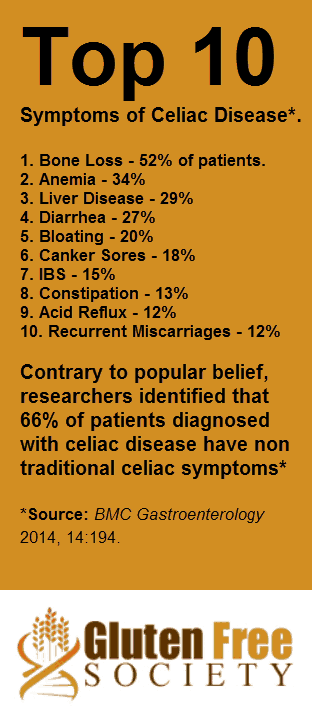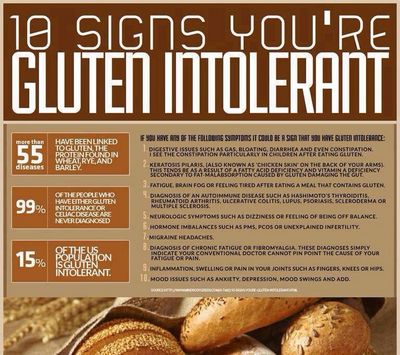Gluten intolerance is one of the more serious forms of celiac disease.

In those with gluten intolerance, repeated exposure to wheat or other similar grains damages the villi of the small intestine, which in turn compromises its ability to absorb essential nutrients. When this happens, the intestinal damage from repeated exposure can cause long-lasting problems beyond immediate intestinal symptoms, including malnutrition, increased bone density, decreased immune system function, and even infertility.
Celiac diseases are diagnosed based on a blood test that measures the amount of antibodies to proteins in the blood. These antibodies react to proteins found in gliadin, a component of gluten. It is often the case that many patients have high levels of antibodies to proteins in their blood because they have also developed celiac diseases, despite having no history of celiac sprue or other digestive disorders. Because these patients have both celiac sprue and gluten intolerance, their doctor will recommend that they take a gluten-free diet in order to avoid aggravating either condition. There are a number of different foods that will be acceptable to those with gluten sensitivity, but it is important for them to consult their doctor before attempting to start a gluten-free diet.
Some people with wheat allergy, for example, are able to eat a gluten-free diet. For others, however, this is not an option. For people who suffer from both conditions, the gluten-free diet may be their only option. If gluten intolerance symptoms are a problem, you will need to find ways to ensure that you continue to digest the foods you do eat while on the diet.
Food allergies can be difficult to manage and may require the use of antihistamines, steroids, or even surgery to effectively treat the symptoms. The best option is to find a way to ensure that you keep your digestive system and intestines working at their optimum level, while avoiding the triggers of the various food allergies you have.
When you first begin your gluten-free diet, it may seem like a challenge to find the right balance between eating foods that are okay to eat and foods that should be avoided. However, this can be done. The trick is to avoid processed foods, refined sugars, refined flour, and dried beans. The last two items are common culprits for people suffering from both celiac and wheat allergies.
Raw fruits and vegetables should be a part of your diet.

They contain essential nutrients such as vitamins and antioxidants, which help to cleanse the body and keep digestive enzymes at optimal levels. A raw vegetable mixed with a dash of olive oil may be just the thing you need to help clear up your digestive system.
Raw nuts are another way to get antioxidants. Almonds are an excellent source of magnesium and potassium, and they are also good sources of vitamin E and essential fatty acids. Nuts have a high amount of protein and can easily be incorporated into your daily diet. Oatmeal is also very rich in protein, so adding some to your oatmeal may provide adequate amounts of both protein and calcium for those with celiac symptoms.
Eating foods like raw dairy products and eggs are also important to maintaining the health of your body. They contain vital nutrients, and they are also good sources of protein. Avoiding wheat foods such as barley, buckwheat, and spelt is a great way to avoid gluten intolerance symptoms and reduce the symptoms that your body is exposed to.
While eliminating all wheat, barley, and other wheat based foods can help to decrease your overall gluten sensitivity, you may need to increase the intake of foods with natural sources of protein such as meats, eggs, milk, and fish. Eating a balanced diet will be important to maintaining a healthy digestive system and immune system. If you find that you are still experiencing symptoms even after you’ve been on the gluten-free diet for about six to eight weeks, talk to your doctor about changing your medication.
If you cannot stick to a strict regimen, there are several natural alternatives available that have helped people to feel better, and reduce their symptoms. Many people find that taking flax seed supplements helps to clear up their digestive systems. It is a great source of many essential fatty acids and can reduce the symptoms of irritable bowel syndrome.
By taking care of yourself, you can prevent and manage the symptoms of gluten and wheat intolerance and get back to living your life with less stress and worry. You should feel more energized, more rested, and less sensitive to foods. A gluten-free diet may even prevent diseases that are related to these foods including anemia and osteoporosis.